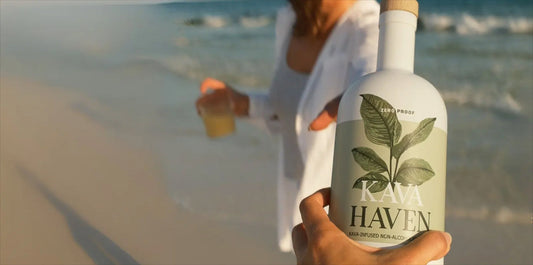You might be wondering, “What’s with Kava’s disclaimer about a ‘risk of rare, but severe, liver injury’? Is Kava Safe?”
You're not alone. In this post, we'll delve into the question of whether kava is safe and provide you with a comprehensive overview of its benefits, potential risks, and considerations. We believe that informed decision-making is crucial, so let's explore the fascinating world of kava together.
Understanding Kava's Origins
Kava, scientifically known as Piper methysticum, has a long history deeply rooted in the traditions of the South Pacific islands. For centuries, kava has been consumed in social and ceremonial settings, bringing people together and fostering a sense of relaxation and connection. The plant is derived from the roots of the kava plant and is typically prepared by grinding or pounding the roots and mixing them with water to create a potent beverage.
Addressing Concerns: Safety and the Liver
One of the primary concerns surrounding kava relates to its potential impact on liver health. In the early 2000s, several cases of liver toxicity were reported, leading to temporary bans and heightened scrutiny. However, it's important to note that these cases were predominantly linked to the consumption of poor-quality kava products, including non-noble varieties and extracts processed with harsh, liver-damaging solvents, like ethanol and butane.
Subsequent research and scientific studies have shed new light on the safety of kava. The overwhelming consensus among experts is that noble kava varieties, prepared using traditional methods and sourced from reputable suppliers, are considered safe for consumption. The World Health Organization (WHO) has conducted extensive research and concluded that the traditional consumption of noble kava is unlikely to cause liver toxicity or adverse health effects when used responsibly.
The WHO says, ”Kava has had at least a 1500-year history of safe use, with liver side effects never having arisen in the ethnopharmacological data. Clinical trials of kava have not revealed hepatotoxicty as a problem. This has been confirmed by further studies evaluating the toxicology of kava drink. Based on available scientific information it can be inferred that kava as a traditional beverage is safe for human consumption.”
Quality Assurance and Regulation
To ensure the safety and integrity of kava products, it is crucial for brands to prioritize quality assurance and regulation. Reputable kava suppliers adhere to stringent standards and employ quality control measures to ensure that their products meet the highest safety standards. These measures include sourcing noble kava varieties, rigorous testing for contaminants, and proper processing techniques.
Additionally, efforts are underway to establish international quality standards for kava. These standards aim to differentiate between safe, traditional kava and inferior or potentially harmful products. By implementing clear guidelines, regulatory bodies and governments can provide consumers with the necessary information to make informed choices about the kava products they consume.
Responsible Consumption and Personal Considerations
While noble kava varieties are generally regarded as safe, it's important to approach any new dietary supplement or herbal remedy with caution. As with any substance, individual responses may vary, and it's essential to consider personal factors such as existing health conditions, medication use, and alcohol consumption. If you have a pre-existing liver condition or are taking medications that may interact with kava, it's advisable to consult with a healthcare professional before incorporating it into your routine.
Embracing the Benefits of Kava
Despite the initial concerns and misconceptions, kava continues to gain popularity due to its numerous potential benefits. When consumed responsibly and in moderation, kava can offer a range of effects, including relaxation, stress relief, and improved social connections. Many enthusiasts have reported enhanced mood, better sleep quality, and a sense of calmness after consuming kava.
When sourced from reputable suppliers and prepared using traditional methods, kava provides an opportunity to explore and appreciate the rich cultural heritage associated with this plant. It offers an avenue for social bonding, relaxation, and the creation of meaningful connections in a world that often demands constant engagement and high-stress levels.
Conclusion
So, is Kava safe? When approached with caution and sourced from reputable suppliers, noble kava varieties prepared using traditional methods have been deemed safe for consumption. The concerns surrounding kava's safety were largely a result of poor-quality products and improper use. By prioritizing quality assurance, adhering to responsible consumption practices, and seeking high-quality kava from trusted sources, individuals can enjoy the potential benefits of this traditional elixir.
Try Kava Haven: A Kava-Infused Non-Alcoholic Spirit
At Kava Haven, we have meticulously crafted a kava-infused non-alcoholic spirit that encapsulates the essence of relaxation and social connection. Our product is thoughtfully formulated with the finest kava extract, zesty lemon juice, and other premium ingredients. Kava Haven provides a refreshing alternative to traditional spirits, allowing you to indulge in moments of tranquility and elevate your social experiences. Whether sipped neat, on the rocks or mixed into your favorite cocktail recipe, Kava Haven seamlessly integrates into any occasion, sparking conversations and fostering a vibrant atmosphere.





7 comments
Can I get a list of the ingredients please?
Could I please have an ingredients list, I have allergies that will cause anaphylaxis shock.
A full list if ingredients would be nice.
Does Kava Haven contain kratom?
I have celiac disease and cannot consume gluten, do you have a list of ingredients?
Can I get a list of the ingredients in your product. Thank you!